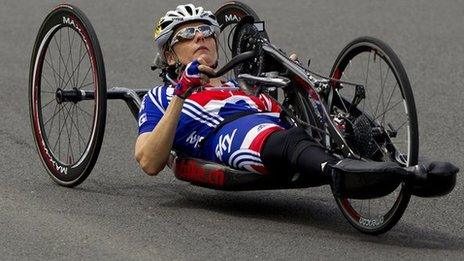Tatyana McFadden: Wheelchair star wants Winter Paralympic glory
- Published
McFadden wants Winter Paralympic glory
It's still getting light in the Utah mountains and the wind is whipping the falling snow into Tatyana McFadden's face as she eases into her sit-ski.
They are hardly conditions conducive to training, but McFadden is hardly your average athlete.
Last year, the 24-year-old American was arguably the most dominant sports person on the planet - bar none.
From the 100m to the marathon, she won every wheelchair title at every distance, including a record six world titles and all four major marathons.
Imagine Usain Bolt beating the best over 26.2 miles, or Mo Farah becoming an all-conquering sprinter.
McFadden's breadth of dominance - golds at 100m, 200m, 400m, 800m, 1500m and 5,000m, to add to her marathon 'grand slam' - was unprecedented.
So how do you follow that? Well, with something completely different.
McFadden is now aiming to challenge for a cross-country skiing medal at the Winter Paralympics in Sochi after only a few weeks of training.
She chose cross-country skiing because it demands strength and endurance, qualities for which she is already renowned, and because it is easier to juggle with her athletics career.
She did consider Alpine or downhill skiing, she says, but decided cross-country was "a better fit".
"Alpine is dangerous," she says. "One mistake and you could break your arm."
But McFadden, whose dominance in wheelchair racing has been built in large part on her incredible upper body strength, does not expect success in her new discipline to come easily.
"I think it might be harder than wheelchair racing," she smiles. "It's about being graceful. Right now, I'm just muscling everything through and it's about trying to be more like a ballerina. I'm really struggling with that."
Even so, McFadden's potential is obvious. She has already won a national title in 2014 and, barring the unexpected, will be in Sochi.
She may even compete in the biathlon too.
"Her strength is phenomenal," says her coach, John Farra. "Our challenge is to help harness it, so it actually translates into ski speed rather than power for the sake of power."
Farra then points out the obvious.
"Tatyana has come to a sport which doesn't have rubber tyres that stick to the road," he says. "She's on skis on slippery white stuff. That's a whole different experience.
"We almost have to ratchet her power down a little and work on being efficient and smooth over the snow. When she gets that, she's going to be unbelievable."
For McFadden, Sochi will be a personal - as well as a sporting - journey.
Born in Russia, her parents, unable to care for a child with spina bifida, external - a fault in the development of the spinal cord - placed her in a St Petersburg orphanage.
Then, at the age of six, she was adopted by an American government official, Deborah McFadden, and brought to the States.
With Tatyana desperately weak, Deborah introduced her to sport to help her physical recovery.
It is fair to say the results have been extraordinary.
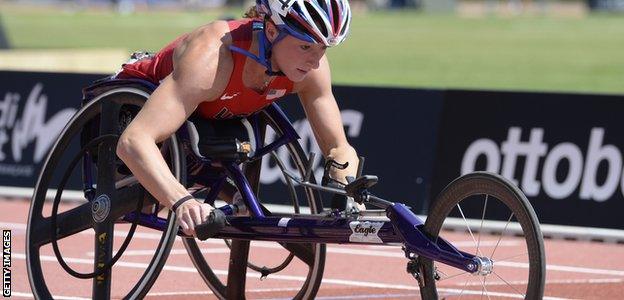
McFadden completed a clean sweep of women's wheelchair marathons in 2013 by winning the New York marathon
Now she is poised to compete in the land of her birth, in pursuit of yet more accolades.
That is only half the story, though.
Last year, the Russian government banned Americans from adopting Russian children, prompting the McFaddens to lead calls for the bill to be dismissed.
Their attempts failed and now Deborah thinks her daughter will want to prove a point.
"Tatyana is not a protester, but she said to me: 'If I go there, I can show the Russians that adopted children are doing great and you can do great things if you have a disability.'
"I asked her how she planned to do this and she said: 'Win a medal.' So I think she wants to show Russia that life is good."
Also watching her compete, for the first time, will be her birth mother.
"I love her," says McFadden, who has invited her to Sochi for the Games.
"She had to do the hardest part. She could have been selfish and kept me, but medically I probably wouldn't have been able to live long in Russia. So I'm not mad at her at all."
And what does she think of her internationally renowned daughter?
"She sees me on the news all over Russia," says McFadden. "I hope she's proud."
Once the Winter Paralympics are over, McFadden will return to her summer job.
Her 'grand slam' of major marathons in 2013 - London, Boston, Chicago and New York - is something no athlete, disabled or able-bodied, had previously achieved. And, just 10 days after Sochi, McFadden will head to London to defend the first of her titles.
Then, a week later, she will try to do the same in Boston.
Few sportspeople can boast such a gruelling schedule, but, for now, her focus is on fast-tracking her way to another medal.
"I've only been on the snow for something like 40 days," she says. "All these other athletes have years on me. Hopefully by Sochi, it will all come good."
- Published3 November 2013
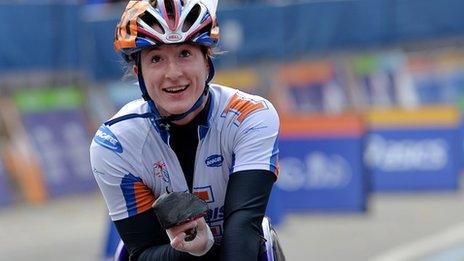
- Published12 July 2013
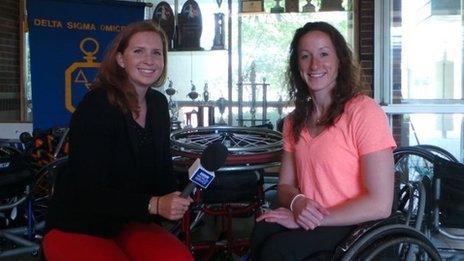
- Published30 May 2013
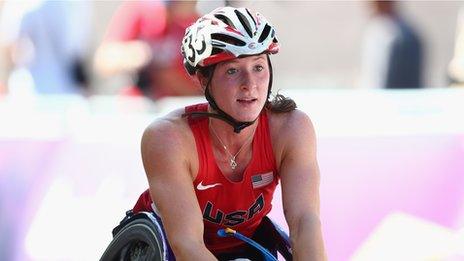
- Published5 September 2016
